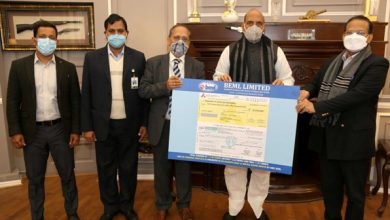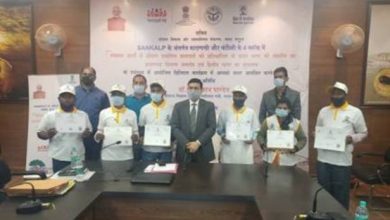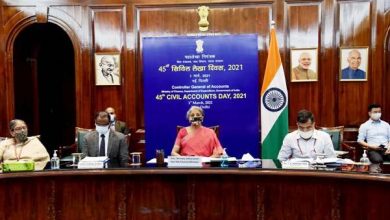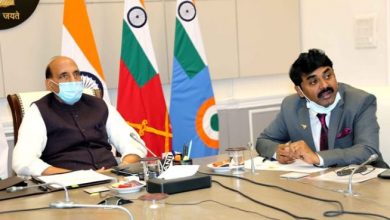India will not accept any outside interference in its internal matters: Vice President
New Delhi: The Vice President of India, Shri M Venkaiah Naidu asserted that India would not accept any outside interference in its internal matters. He stressed that the safety, security and integrity of India are non-negotiable.
Addressing participants of Kautilya Fellows Programme (KFP) organized by India Foundation, he said that the reorganization of Jammu and Kashmir State into two union territories of Jammu & Kashmir and Ladakh was meant to fast-track the development of the region.
Pointing out that India believes in the philosophy of Vasudhaiva Kutumbakam that treats the whole world as one family and that it believes in sharing knowledge and wisdom, the Vice President said that this very ideal had shaped its interaction and outreach.
He said that the same philosophy guided India’s external relations with other countries, both near and far. Bemoaning the attempts of one of India’s neighbors to promote cross-border terrorism by aiding, abetting and funding terror, Shri Naidu said that India always believed in peaceful co-existence with all its neighbors. He said that India was never an aggressor and never attacked any country.
Describing the menace of terror as the enemy of entire humanity and that it has nothing to do with religion, Shri Naidu said that mixing of religion with terror was problematic.
The Vice President urged the world community and multinational organizations such as the UN to conclude discussions on the Comprehensive Convention on International Terrorism proposed by India which has been pending before the UN since 1996. He said that it was the duty of the world community to put an end to terror in all its forms and manifestations.
Stating that secularism was ingrained in the DNA of all Indians’ because of its age-old civilizational values, Shri Naidu said all minorities were safe and secure in India.
Shri Naidu said that despite the global economic slowdown, India continues to be one of the fastest-growing economies in the world and is poised to become the third-largest economy if the series of reforms were continued at the same pace.
Shri Naidu said that India with its tremendous youth population could become the global hub for Human Resources. He opined that the programs like Make in India, Digital India, and Skill India were empowering the youth and creating enterprises. “If we manage to educate and skill our vast youth population, we can very well become a global business hub,” he added.
Vice Admiral Shekhar Sinha, member of the Board of Trustees, India Foundation and Shri Ram Madhav, member of Board of Governors and more than 100 participants of Kautilya Fellows Programme attended the event.
The following is the full text of the speech:
I welcome all the participants of the Kautilya Fellows Programme (KFP) to the official residence of Vice President of India. I am happy to interact with the diplomats, researchers, academics and policy think-tanks who are participating in this fellowship program.
First of all, let me congratulate all of you for showing a keen interest in understanding India’s Foreign Policy and Public Policy.
I was informed that the Kautilya Fellowship Programme provides an opportunity to get a deeper and granular understanding of India’s diplomatic agenda, India’s evolving geopolitical ties, its domestic policies and also an overview of the key institutions of India’s democracy.
Kautilya, in whose name this fellowship program has been established, was a visionary who wrote a comprehensive Treatise on politics, economics, and governance. His magnum opus of 6000 verses called ‘Arthashastra’ deals with 180 aspects of the Statecraft.
He laid the theoretical foundations of a powerful, welfare State when he postulated that: “Praja sukhe sukham raja, prajanam tu hitey hitam…”
(In the happiness of subjects lies the happiness of the king and in the welfare of public lies his welfare….)
I am glad that the Government of India, cognizant of this dynamism in the global order, has made tremendous efforts to revive these ancient philosophies and incorporate them into the new strategic path for India.
I would like to share India’s story with all of you. It is the story of a great civilization that believes in the philosophy of Vasudhaiva Kutumbakam. India treats the whole world as one family and it believes in sharing knowledge and wisdom. This ideal has shaped our interaction and outreach. This has guided our external relationship with the countries, both near and far.
Currently home to more than 130 crore people, India has always been the advocate of peace, harmony and universal brotherhood.
The text Sarve bhavantu sukhinaḥ from the Brihadaranyaka Upanishad sums up India’s world view.
Om, Sarve bhavantu sukhinaḥ
Sarve santu nirāmayāḥ
Sarve bhadrāṇi paśyantu
Mā kashchit duḥkha bhāgbhavet
Oṁ Shāntiḥ, Shāntiḥ, Shāntiḥ
May all be prosperous and happy
May all be free from illness
May all see what is spiritually uplifting
May no one suffer
Om peace, peace, peace
This Shanti mantra and its essence reverberate in India’s approach to internationalism. India has been an ardent advocate of peace since time immemorial and has never attacked any other country.
India celebrates and appreciates diversity in all its vibrant forms. It is home to more than 300 languages and is very well known for its vivid culture.
Unity and integrity of the nation and its security are of paramount importance to us. India will not remain a mute spectator to terrorism and the rising tide of senseless violence. India has been fortunate to receive support from several countries in its crusade against the evil forces of terror.
India has boldly put forth its stand on the menace of terror and has been asking the world leaders to adopt the Comprehensive Convention on International Terrorism proposed by India which is pending before the UN since 1996. India seeks the world’s cooperation and support to put in place an effective international mandate against terrorism.
Today, India is the fastest-growing economy in the world. We believe that we can grow faster if we can secure peace on all our borders.
Through its active engagements, bold voice, and leadership in several global multilateral forums such as the International Solar Alliance, BIMSTEC, BRICS, and other such platforms, India has emerged as a significant regional player in the new global order today.
Another aspect that stands out in contemporary Indian foreign policy is the proactive engagements with the Indian diaspora settled across the world. Indian diaspora numbering more than 30 million contribute to foreign exchange remittances well over $60 billion annually.
The Indian government through its various outreach projects has nurtured successful partnerships with the diaspora, making them an essential part of India’s growth and development story.
For those who are not aware, the electorate of 900 million participated in recently concluded General Elections.
India’s General Election is the world’s largest democratic exercise. The 2019 elections were held peacefully and what is heartening is that every passing election witnesses a larger number of voters exercising their franchise.
This is an eloquent testimony to the robustness, the stability and the vibrancy of our democracy and polity.
India is a 70-year-old democracy that has witnessed a tremendous transformation. Indian democracy gains more maturity with every passing election, and it continues to set new standards of successful, impartial, and transparent election processes and governance policies.
The main aim of governance in India has been to take the benefits of government programs and policies to the last man in the remote corner of society.
Guided by the call for ‘Grama Swarajya’ given by Father of the Nation Mahatma Gandhi, the call for ‘Antyodaya’ given by Pt. Deen Dayal Upadhyaya, Baba Saheb Ambedkar’s principle of Social Justice, Sardar Vallabhbhai Patel’s mission of ‘Ek Bharat- Shreshtha Bharat’, India has been striving to bring about sustainable development and inclusive growth.
As you all are aware, there is a strong global interest in India and its story and the reformative policies undertaken by the government at the center and various governments at the state level, to accelerate growth.
Recently, the government has tabled the economic survey on the floor of the parliament. It outlined a strategy to achieve a $5 trillion economy. The country is slated to maintain a steady growth rate. For the current fiscal, the projected GDP growth of 5 percent and the projected revival of economic growth for the next fiscal is 6-6.5 percent.
India’s ranking in the Ease of Doing Business Index has improved from 142 in 2014 to 63 in 2020. Measures such as reduction of corporate tax and the codification of labor laws are expected to further improve the ease of doing business.
Global investors have confidence in the strong fundamentals of the Indian economy and a predictable and transparent policy regime.
A revolutionary taxation reform, the Goods and Services Tax (GST) was brought in and it is now being lauded by the Global community.
Another important reform was Direct Benefit Transfer (DBT), under which funds from more than 450 schemes are being directly credited into the accounts of beneficiaries. This has eliminated the involvement of middlemen and has cut down leakage and corruption considerably.
India with its tremendous youth population could become the global hub for Human Resources. Programs implemented by the government such as Make in India, Digital India, and Skill India are empowering the youth to move towards creating enterprises rather than becoming job seekers.
If we manage to educate and skill our vast youth population, we can very well become a global business hub.
As I mentioned earlier, inclusiveness and sustainability have been integral to India’s approach to development. Strengthening and empowering people living in the remote corners of the country by way of technology and infrastructure have been the focus of successive governments.
Recent legislative measures such as the reorganization of Jammu and Kashmir State into two union territories of Jammu & Kashmir and Ladakh were also meant to fast-track the development of the region. I am hopeful that the allocation of Rs 30,757 crore to J&K and Rs 5,958 crore to Ladakh in the Budget for the year will greatly benefit the people.
India has also been laying a greater emphasis on bridging the urban-rural divide and taking steps to double the income of farmers by 2022.
As stated earlier, India is a young and aspirational country with a very bright future ahead.
India has always wanted all of humanity to co-exist peacefully and co-endeavor to achieve a better life for everyone.
I am sure that this Programme will help the participants to know India more closely and to recognize its potential more intimately.
I am hopeful that many enduring and meaningful partnerships would be forged between the participants during the course of this fellowship and that you will endeavor, both individually and collectively, to build a better world, drawing inspiration from India’s civilizational values and its relentless efforts to create a bright future.




